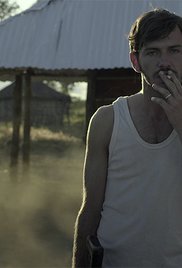
CARTAS DA GUERRA/ LETTERS FROM WAR
Portugal, 2016, 105 minutes, Black and white.
Miguel Nunes, Margarita Vila- Nova.
Directed by Ivo Ferreira.
While this is a war film, specifically the war in Angola in the 1970s, the clash between Portugal and its colony, Angola, there is not a great deal of war action in the film, some mines, some shooting, some interrogations, rebuilding a bridge for a trip to pass over…
And, of course, in the 21st century, there are questions about Portugal’s colonial past, its propaganda that everybody in the colonies should feel themselves Portuguese.
The title indicates something of the tone of the film. There are some moments of being disconcerted at the opening when we eventually realise that the letters by the man from the war are read aloud in voice-over by his wife, while her letters to him a read by him – except for the very last one, his imploring his wife and daughter to come to be close to him in Angola.
The film is very much an art house film, photographed evocatively in black and white, relying a great deal on the spoken word, so many letters revealing the characters and what was going on in the war effort in Angola. Some audiences will be very taken, while others will not be taken at all, by an episode in the middle of the film, running for several minutes, while the husband indulges in a very large series of metaphors, some sublime, some very mundane, to express his love for and appreciation of his wife. (and there is something of a reprisal of this poetic outburst towards the end of the film).
The central character is a young doctor, commissioned for a kind of national service for two years, working as a soldier but also as the doctor on a base, caring for wounds after action, but also caring psychologically for some of the soldiers, one of whom, a friend, is desperate for the doctor to find some illness in him so that he can be sent back. The doctor is not compliant and there is a brief but somewhat overwhelming moment, the soldier naked, taking his gun, hurrying out into the bush and a shot firing.
Morale amongst the man is uneven, the doctor playing chess with the captain, the other men talking about their lives and families, no sight of a chaplain at all. The isolation and all male company leads to some tension, some moments of rape, and, reminiscent of Apocalypse Now, the men’s reaction to two young singer dancers from Portugal for the men’s libidinous energy and release. In the meantime, the doctor continues to profess devotion to his wife.
Time passes, everything is rather repetitious, the audience has no real idea of who the enemy is or why. At one stage a little girl is rescued after her parents’ death and the doctor considers adopting her – only for her grandfather to arrive and take her away.
As the first year passes, slowly, and there is some celebration of Christmas, the doctor is also on the verge of some traumatic stress, but the hope of is, as the moon rises evocatively, that wife and daughter will come to join him and they will be able to have something of a life.
And, to this extent, the film is anti-war and anti-colonial.
1. Portugal, the 1970s, the war in Angola, colonial past, military action? The personal story?
2. Black-and-white photography, style? Angola locations, camps, feels, rivers, the bridge? The musical score?
3. The title, the focus on letters, the voice-over, the male voice for the female letters, the female voice for the male letters? The initial being disconcerted by the voices? A film of passion, a film of poetry, the many metaphors, the impact of this metaphorical long list in the middle of the film, under a range of visuals, and at the end? Antonio’s final letter in his own voice inviting his wife and daughter to come?
4. Background knowledge, Portuguese colonies, Portugal in 1971 and government, war in Angola? The wars around the world at the same time – and the comparisons with the Americans in Vietnam?
5. War action, ambushes, the mines, sabotage, interrogations? It not being clear who the enemy was, or why? The Portuguese emphasis at the time on propaganda about Portugal and its colonies and identity?
6. Antonio, doctor, leaving, his pregnant wife, talking about the wharf, arrival, the quarters, with the various men, the captain, playing chess, smoking, attending wounds? Interviews with psychologically disturbed soldiers? The effect on him? Watching movies, listening to the music? The encounter with the little girl, thinking of adopting her, giving her back to her grandfather? The cumulative effect?
7. The men and their stories, men together, the effect about woman, seeing the women in the movies, the two singers and their concerts, the effect? Morale? No chaplain?
8. The soldier, friendly to Antonio, asking for help, to have some kind of illness, wanting to go home, naked in the bush, with the gun?
9. Antonio and his novel, trying to write, a year in Angola, the Christmas experience? The bridge down, rebuilding, moving on? A film of insight? Emotion?